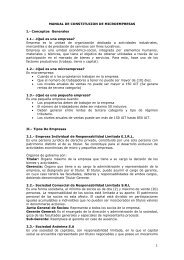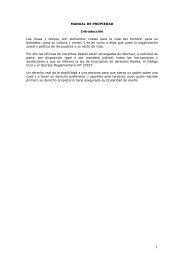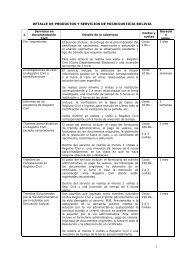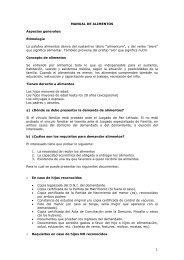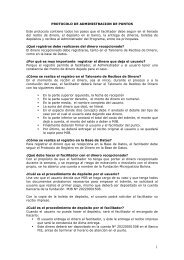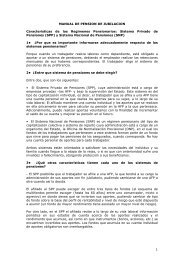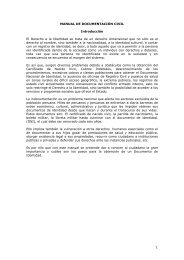ICISS report - International Coalition for the Responsibility to Protect
ICISS report - International Coalition for the Responsibility to Protect
ICISS report - International Coalition for the Responsibility to Protect
Create successful ePaper yourself
Turn your PDF publications into a flip-book with our unique Google optimized e-Paper software.
The <strong>Responsibility</strong> <strong>to</strong> <strong>Protect</strong> 3<br />
1.9 The Commission was strongly committed from <strong>the</strong> outset <strong>to</strong> consulting as widely as<br />
possible around <strong>the</strong> world, including in <strong>the</strong> countries of all five permanent members of <strong>the</strong><br />
Security Council. Over <strong>the</strong> course of a year, accordingly, roundtable meetings or consultations<br />
were conducted in Beijing, Cairo, Geneva, London, Mapu<strong>to</strong>, New Delhi, New York, Ottawa,<br />
Paris, St Petersburg, Santiago and Washing<strong>to</strong>n. The discussions at those meetings were<br />
invariably rich and rewarding; <strong>the</strong>y are summarized in <strong>the</strong> supplementary volume accompanying<br />
this <strong>report</strong>. In addition, individual Commissioners and members of <strong>the</strong> research team<br />
attended a large number of conferences and seminars – often by special invitation or in a<br />
representative capacity. The Commission has also made a particular ef<strong>for</strong>t <strong>to</strong> consult a broad<br />
range of academic thinking and expertise; much of this analysis and advice is embodied in <strong>the</strong><br />
research papers and bibliography contained in <strong>the</strong> supplementary volume.<br />
THE CHANGING INTERNATIONAL ENVIRONMENT<br />
1.10 The issues and preoccupations of <strong>the</strong> 21 st century present new and often fundamentally<br />
different types of challenges from those that faced <strong>the</strong> world in 1945, when <strong>the</strong> United<br />
Nations was founded. As new realities and challenges have emerged, so <strong>to</strong>o have new<br />
expectations <strong>for</strong> action and new standards of conduct in national and international affairs.<br />
Since, <strong>for</strong> example, <strong>the</strong> terrorist attacks of 11 September 2001 on <strong>the</strong> World Trade Center and<br />
Pentagon, it has become evident that <strong>the</strong> war against terrorism <strong>the</strong> world must now fight –<br />
one with no contested frontiers and a largely invisible enemy – is one like no o<strong>the</strong>r war<br />
be<strong>for</strong>e it.<br />
1.11 Many new international institutions have been created <strong>to</strong> meet <strong>the</strong>se changed circumstances.<br />
In key respects, however, <strong>the</strong> mandates and capacity of international institutions<br />
have not kept pace with international needs or modern expectations. Above all, <strong>the</strong> issue of<br />
international intervention <strong>for</strong> human protection purposes is a clear and compelling<br />
example of concerted action urgently being needed <strong>to</strong> bring international norms and<br />
institutions in line with international needs and expectations.<br />
1.12 The current debate on intervention <strong>for</strong> human protection purposes is itself both a<br />
product and a reflection of how much has changed since <strong>the</strong> UN was established. The<br />
current debate takes place in <strong>the</strong> context of a broadly expanded range of state, non-state, and<br />
institutional ac<strong>to</strong>rs, and increasingly evident interaction and interdependence among <strong>the</strong>m.<br />
It is a debate that reflects new sets of issues and new types of concerns. It is a debate that<br />
is being conducted within <strong>the</strong> framework of new standards of conduct <strong>for</strong> states and<br />
individuals, and in a context of greatly increased expectations <strong>for</strong> action. And it is a debate<br />
that takes place within an institutional framework that since <strong>the</strong> end of <strong>the</strong> Cold War has<br />
held out <strong>the</strong> prospect of effective joint international action <strong>to</strong> address issues of peace,<br />
security, human rights and sustainable development on a global scale.<br />
New Ac<strong>to</strong>rs<br />
1.13 With new ac<strong>to</strong>rs – not least new states, with <strong>the</strong> UN growing from 51 member states<br />
in 1945 <strong>to</strong> 189 <strong>to</strong>day – has come a wide range of new voices, perspectives, interests,<br />
experiences and aspirations. Toge<strong>the</strong>r, <strong>the</strong>se new international ac<strong>to</strong>rs have added both<br />
depth and texture <strong>to</strong> <strong>the</strong> increasingly rich tapestry of international society and important<br />
institutional credibility and practical expertise <strong>to</strong> <strong>the</strong> wider debate.<br />
1.14 Prominent among <strong>the</strong> range of important new ac<strong>to</strong>rs are a number of institutional<br />
ac<strong>to</strong>rs and mechanisms, especially in <strong>the</strong> areas of human rights and human security. They<br />
have included, among o<strong>the</strong>rs, <strong>the</strong> UN High Commissioner <strong>for</strong> Human Rights and <strong>the</strong>



